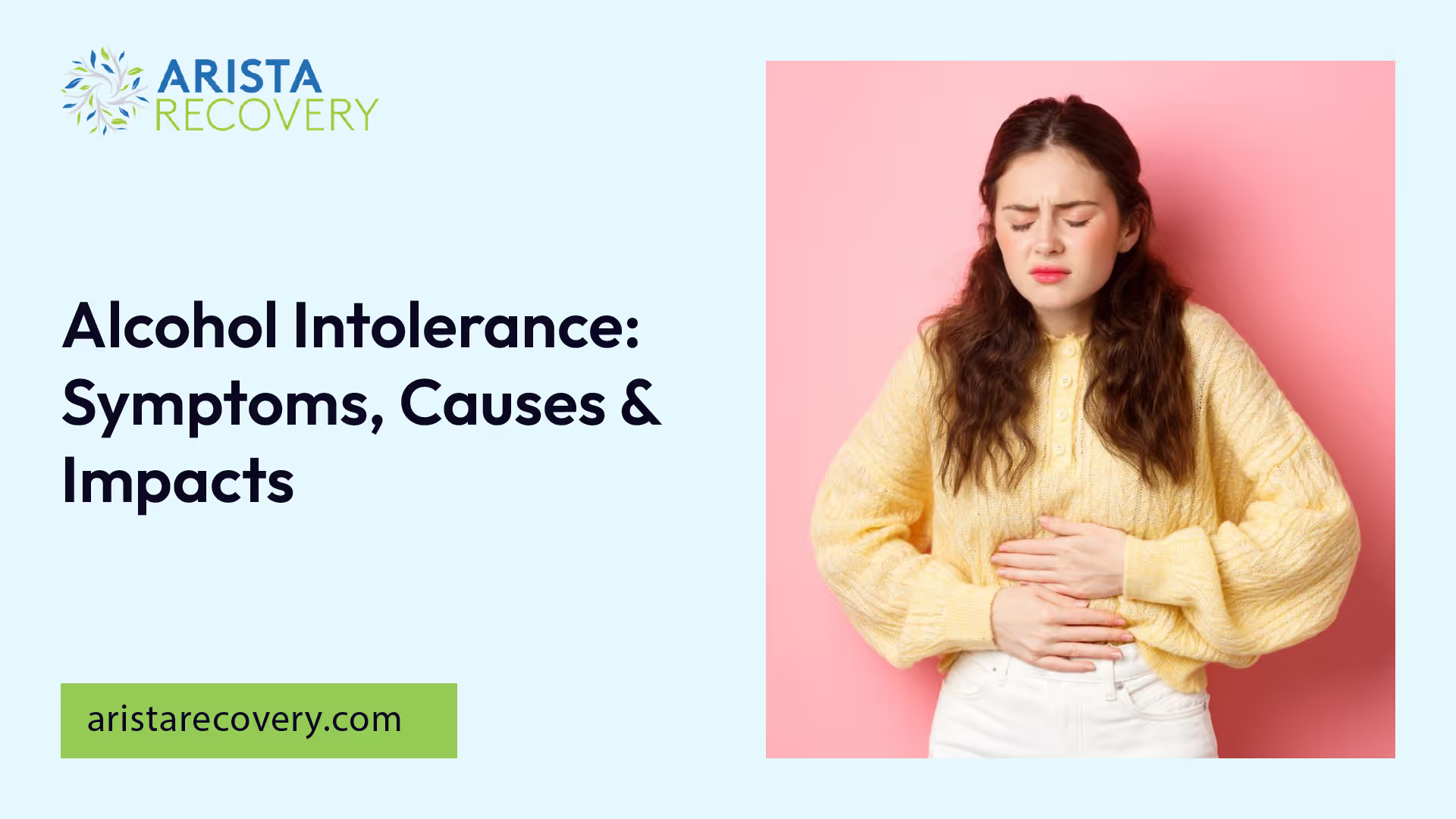Alcohol Intolerance: Symptoms, Causes & Impacts

Understanding Alcohol Intolerance
Alcohol intolerance is a topic that often goes undiscussed but is crucial to understand, given its effect on the health and well-being of those affected. This section aims to shed light on the definition, causes, symptoms, and effects of alcohol intolerance.
Definition and Causes
Alcohol intolerance is an inherited metabolic disorder that is lifelong and does not have a cure. It results from a genetic mutation affecting the activity of the ALDH2 enzyme. This mutation leads to the accumulation of acetaldehyde in the blood and tissues, thus causing symptoms associated with alcohol intolerance. Avoiding alcohol is the only sure way to prevent these reactions, given that the intolerance is due to the body's inability to efficiently break down alcohol.

Symptoms and Effects
Those who have alcohol intolerance experience immediate, uncomfortable reactions after consuming alcohol. The most common signs and symptoms include a stuffy nose and skin flushing, a condition known as alcohol flushing syndrome. Other symptoms such as nausea are also prevalent. The affected areas, including the face, neck, and chest, become warm and red or pink right after drinking alcohol.
For minor reactions, over-the-counter or prescription antihistamines might help reduce symptoms. However, complete avoidance of alcohol or the specific beverage or ingredients causing the issue is the only guaranteed way to avoid alcohol intolerance symptoms or an allergic reaction [3].
By understanding the causes and symptoms of alcohol intolerance, individuals can better manage their condition and make informed decisions about alcohol consumption. Seeking medical advice is crucial for proper diagnosis and effective management of the disorder.
Prevalence of Alcohol Intolerance
Alcohol intolerance tends to differ among various groups, with certain discrepancies observed across genders and ethnicities. It's essential to understand these disparities to better grasp the scope of alcohol intolerance.
Gender Disparities
Alcohol intolerance demonstrates a certain degree of gender disparity. According to a study of 948 individuals conducted by the Cleveland Clinic, 7.2% of participants self-reported wine intolerance. Interestingly, the prevalence was higher among women (8.9%) compared to men (5.2%). However, it remains uncertain if these percentages accurately reflect the general population.
Ethnicity and Genetic Factors
Ethnicity also plays a substantial role in the occurrence of alcohol intolerance. People of East Asian descent are more likely to inherit the genetic mutation causing alcohol intolerance, leading to a higher prevalence of the condition in this population group.
Between 30% - 50% of individuals of East Asian descent have alcohol intolerance, a fact leading many to refer to the condition as "Asian flush" or "Asian glow". However, although people of Asian ancestry are most at risk for alcohol intolerance, the condition can affect individuals of all races and ethnicities.
These statistics underline the wide-ranging prevalence of alcohol intolerance. It's important to note that while certain groups may exhibit higher rates of the condition, anyone, regardless of gender or ethnicity, can experience alcohol intolerance.
Managing Alcohol Intolerance
Alcohol intolerance is a lifelong condition, often inherited from parents, and there is currently no cure for it [1]. However, the symptoms can be managed and complications can be prevented. There are primarily two ways to manage this condition: avoidance of alcohol and the use of medication for symptom relief.
Avoidance of Alcohol
The most effective way to avoid the uncomfortable symptoms associated with alcohol intolerance is to abstain from alcohol consumption. Drinking alcohol is not advisable for those with this condition, as the negative side effects are a clear indication that it is unsafe for their health.
Ignoring the symptoms and continuing to consume alcohol can lead to severe long-term effects. Hence, individuals with alcohol intolerance are strongly encouraged to limit or completely exclude alcohol from their diet. This is the most effective way to manage the condition and prevent the associated health risks.
Medication for Symptom Relief
In some cases, over-the-counter or prescription antihistamines might help reduce minor symptoms of alcohol intolerance. However, it's important to understand that using medication to alleviate symptoms does not reduce the risks associated with the condition [4].
Furthermore, these medications should not be seen as a solution that enables safe alcohol consumption. They might only provide temporary relief from minor symptoms and do not address the underlying intolerance to alcohol. Therefore, medication should be seen as a short-term solution for symptom relief, not a long-term strategy for managing alcohol intolerance.
In conclusion, managing alcohol intolerance primarily involves abstaining from alcohol. While some medications can provide temporary relief from symptoms, they do not eliminate the risks associated with this condition. Individuals with alcohol intolerance are urged to seek medical advice and prioritize their health by avoiding alcohol.
Differences from Alcohol Allergy
While both alcohol intolerance and alcohol allergy can produce similar reactions, they are fundamentally different conditions. It's crucial to understand these differences for proper diagnosis and treatment.
Immune Response vs. Metabolic Disorder
Alcohol intolerance is a genetic metabolic disorder, specifically a digestive system disorder. It results from a genetic mutation that affects the activity of the ALDH2 enzyme, leading to the accumulation of acetaldehyde in the blood and tissues [1]. This build-up triggers symptoms like flushing of the face, neck, and chest.
On the other hand, an alcohol allergy is an immune system response. The immune system overreacts to an ingredient in alcohol, such as chemicals, grains, or preservatives. This overreaction can cause various symptoms that may resemble those of alcohol intolerance.
Symptoms Comparison
While symptoms of alcohol intolerance and alcohol allergy can overlap, there are distinctions that can help differentiate between the two.
Alcohol intolerance typically results in flushing and stomach upset, while an alcohol allergy can cause difficulty breathing, coughing, and a runny nose. Most notably, an allergic reaction can be triggered by as little as one sip of alcohol, as it results from the body creating antibodies against allergens in the beverages.
It's especially important for young people who are having their first experiences with alcohol to understand these differences. Misattributing the symptoms of alcohol intolerance to intoxication could lead to misunderstanding the severity of the issue. In case of persistent or severe reactions, they should consult a healthcare provider for proper diagnosis and guidance.
Health Risks and Complications
Alcohol intolerance is more than just an inconvenience; it can pose serious health risks and complications, especially when symptoms are ignored. It's important to understand the potential long-term effects and associated health conditions.
Long-term Effects
People with alcohol intolerance often experience symptoms such as flushing, rapid heart rate, headache, low blood pressure, hives, runny nose, and stomach pain. Ignoring these symptoms and continuing to consume alcohol can lead to severe long-term effects. Prolonged alcohol consumption for individuals with alcohol intolerance can increase the risk of developing cancers of the mouth, throat, esophagus, stomach, and liver, as well as heart disease and stroke.
These long-term effects can significantly impact one's quality of life and overall health. There is currently no cure or specific treatment for alcohol intolerance, and attempts to alleviate symptoms with medications like antihistamines do not reduce the risks associated with the condition.
Associated Health Conditions
In addition to the long-term effects mentioned, alcohol intolerance can potentially exacerbate existing medical conditions or contribute to the development of new ones. The reaction caused by alcohol intolerance can lead to major health problems, including cancers of the mouth, throat, esophagus, stomach, and liver.
Moreover, the strain put on the cardiovascular system due to the symptoms of alcohol intolerance can increase the risk of heart disease and stroke. It is therefore crucial for individuals with alcohol intolerance to be aware of these potential dangers and understand that consuming alcohol is not safe for them.
In conclusion, alcohol intolerance is a serious condition that requires due awareness and management. Ignoring symptoms and continuing to consume alcohol despite intolerance can lead to serious health risks and complications. It is crucial to seek medical advice if you suspect you may have alcohol intolerance and to abstain from alcohol to mitigate these risks.
Importance of Awareness
Understanding alcohol intolerance and its implications is critical in today's society where alcohol consumption is often interwoven with social activities. Increasing awareness about this condition can help individuals make informed decisions about their health and well-being.
Peer Influence
Peer relationships are consistently linked to alcohol use, particularly in college students. Social pressure can influence decisions to drink alcohol, making it crucial for individuals to understand the severity of alcohol intolerance, especially those having their first experiences with alcohol. Young individuals are at risk of mistaking the symptoms of alcohol intolerance for alcohol intoxication. Recognizing the severity of alcohol intolerance is especially important when influenced by peers to consume alcohol.
Alcohol intolerant individuals should be aware of the potential dangers of ignoring symptoms. They should understand that consuming alcohol is not safe for them, and the negative side effects experienced are a clear indication that alcohol consumption is inadvisable for their health.
Seeking Medical Advice
If you are experiencing symptoms after consuming alcohol and are unsure if it's due to alcohol allergies or alcohol intolerance, it's important to raise your concerns with your doctor at your next checkup [4]. Understanding the differences between alcohol allergies and alcohol intolerance is crucial for proper diagnosis and management of the condition.
It's worth noting that there is no cure or specific treatment for alcohol intolerance. Attempting to alleviate symptoms with medications like antihistamines does not reduce the risks associated with the condition, and the long-term effects of ignoring alcohol intolerance symptoms can be severe.
In summary, increasing awareness about alcohol intolerance is key. Understanding the symptoms, seeking professional medical advice, and resisting peer pressure to consume alcohol can help individuals manage this condition more effectively. It's crucial for society as a whole to acknowledge and understand alcohol intolerance to foster an environment where individuals can make safe and healthy choices regarding alcohol consumption.
References
[1]: https://my.clevelandclinic.org/health/diseases/17659-alcohol-intolerance
[2]: https://www.mayoclinic.org/diseases-conditions/alcohol-intolerance/symptoms-causes/syc-20369211
[3]: https://www.mayoclinic.org/diseases-conditions/alcohol-intolerance/diagnosis-treatment/drc-20369215
[4]: https://www.cedars-sinai.org/blog/alcohol-intolerance-what-you-need-to-know.html
When mental health challenges and addiction intersect, it can feel isolating. At Arista, we offer compassionate, evidence-based, and trauma-informed care to help you heal, grow, and move forward.
You’re not alone in this.
When mental health challenges and addiction intersect, it can feel isolating. At Arista, we offer compassionate, evidence-based, and trauma-informed care to help you heal, grow, and move forward.
Support that moves with you.
You’ve taken a brave first step. At Arista Recovery, we’re here to help you continue with best-in-class care designed for long-term healing and support.
.webp)






